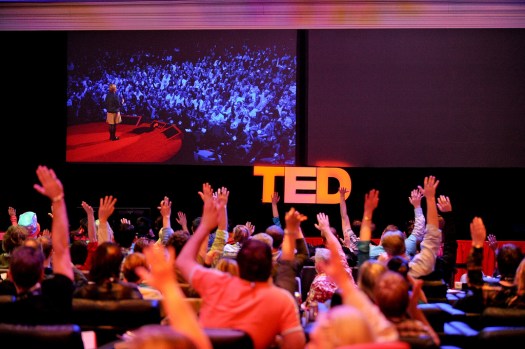Photo: Michael Brands
If watching a TEDTalk inspires insights (see this post for more) — imagine giving one. From speakers’ own blogs:
Here’s what Brené Brown learned >>
The first lesson I learned is about vulnerability (no suprise). The folks in the picture are raising their hands in response to two questions that I asked during my talk …
When you watched people on this stage being vulnerable, how many of you thought it was courageous? Hands shot up across the room!
Kate Messner shares “Six lessons I learned at TED2012” >>
Here’s one: 5. Never underestimate the power of spectacular failure. If there’s one big idea I took away from TED, it was this. Story after story from people who took the stage were stories of failure. Donald Sadoway from MIT talked about the liquid-metal battery he and his students have invented — and he included the stories about how it didn’t work, before it did work. Andrew Stanton, the creator of Toy Story and WALL-E, shared a scene he had originally envisioned for the opening of Toy Story. It didn’t work and didn’t make the cut. And Regina Dugan, the head of the Defense Advanced Research Projects Agency, asked us this: What would you do if you knew that failure was impossible?
And Angie Miller gives herself a moving reminder of (in the middle of TED madness) what to take seriously >>
Leymah Gbowee gave an impromptu talk during a lunch on Day Three of TED, and asked a big, big question of the powerful women in the room: “How can you let your politicians talk to you that way?” Read Sunny Bates’ report >>
Susan Cain shares an insight from someone she met >>
I met some really incredible people at last week’s TED conference, and Rabbi David Wolpe was one of them. Here he is on the power of solitude:
“When he was a child, the Seer of Lublin (later a famous Hasidic master) used to go off into the woods by himself. When his father, worried, asked him why, he said “I go there to find God.” His father said to him, ”But my son, don’t you know that God is the same everywhere?” “God is” said the boy, “but I’m not.”
Paul Gilding asks: Will the techno-optimists save the world? >>
As the week moved on, some concluded that the crisis vs techno-optimism division was quite artificial. … Others, including myself, became more convinced that techno-optimism, rather than being harmless, was potentially quite dangerous. This was all the more the case after we heard a presentation from neuroscientist Tali Sharot on humankind’s “optimism bias.” This explained how we tend strongly towards a view that things will always work out – that the future will always be better than the past. This trait has brought many benefits to humanity over our species history – after all we wouldn’t have gone hunting mammoths if we didn’t occasionally suffer delusions of optimism in the face of quite serious challenges!
But this time we face different types of challenges, ones which might make that optimism bias a threat to our species’ success rather a source of positive evolution.
And Jared Ficklin came away with this insight:
[tweet https://twitter.com/jaredrawk/status/175483371990949888%5D

Comments (2)
Pingback: How to give a TED Talk (and how not to) « Jimmy Guterman's blog
Pingback: Six Lessons I Learned as a Speaker at TED